Ward A.W. The Cambridge History of British Foreign Policy. 1783-1919. Volume 3
Подождите немного. Документ загружается.

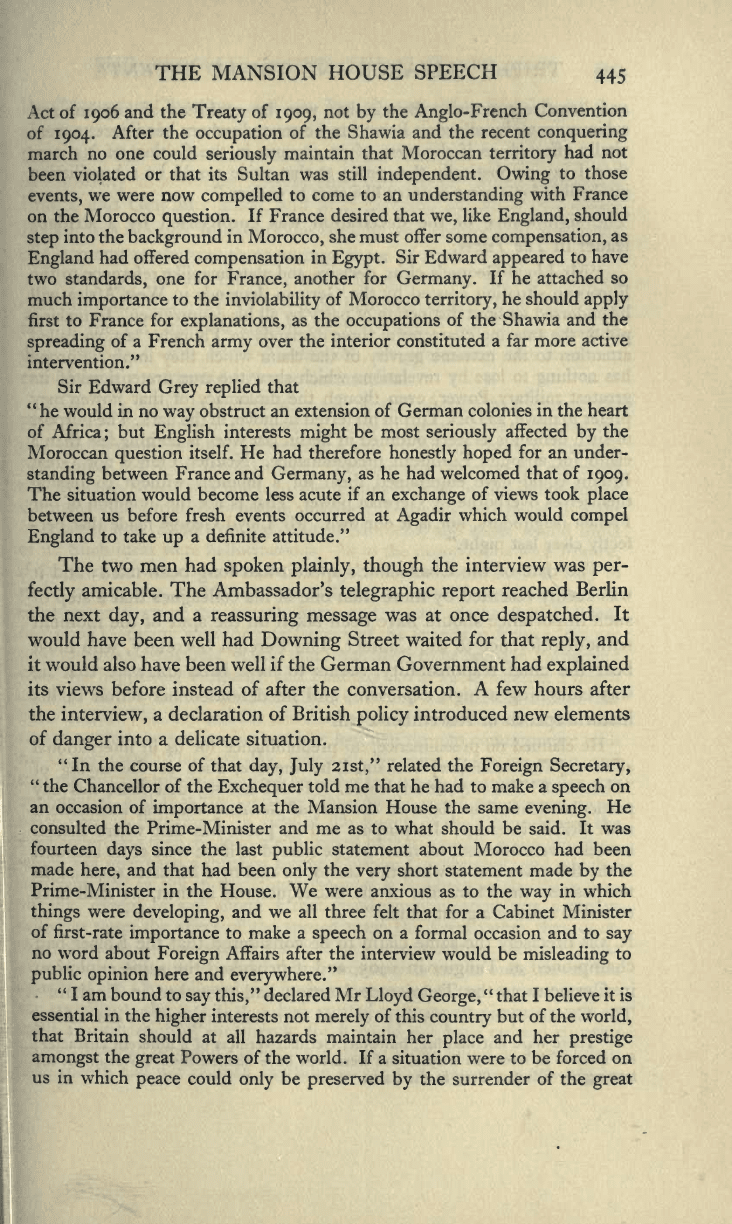
THE MANSION
HOUSE
SPEECH
445
Act
of
1906
and
the
Treaty
of
1909,
not
by
the
Anglo-
French
Convention
of
1904.
After the
occupation
of the
Shawia and the
recent
conquering
march
no one could
seriously
maintain that
Moroccan
territory
had
not
been
violated
or
that its Sultan
was still
independent.
Owing
to those
events,
we were now
compelled
to come
to an
understanding
with
France
on the Morocco
question.
If
France
desired that
we,
like
England,
should
step
into the
background
in
Morocco,
she
must offer some
compensation,
as
England
had offered
compensation
in
Egypt.
Sir
Edward
appeared
to have
two
standards,
one for
France,
another
for
Germany.
If he attached
so
much
importance
to the
inviolability
of Morocco
territory,
he should
apply
first
to France for
explanations,
as the
occupations
of the Shawia
and the
spreading
of
a French
army
over the
interior constituted
a far
more active
intervention."
Sir
Edward
Grey replied
that
"
he would in no
way
obstruct
an
extension
of German colonies
in the heart
of
Africa;
but
English
interests
might
be
most
seriously
affected
by
the
Moroccan
question
itself. He
had
therefore
honestly hoped
for an under-
standing
between France
and
Germany,
as he had welcomed
that
of
1909.
The situation would become less acute
if an
exchange
of
views took
place
between
us before fresh events
occurred at
Agadir
which
would
compel
England
to
take
up
a definite attitude."
The two men
had
spoken
plainly, though
the interview
was
per-
fectly
amicable. The
Ambassador's
telegraphic report
reached
Berlin
the next
day,
and a
reassuring
message
was
at
once
despatched.
It
would
have been well
had
Downing
Street waited
for
that
reply,
and
it
would
also have been well
if
the
German
Government
had
explained
its views before instead
of after
the conversation.
A
few
hours after
the
interview,
a declaration
of
British
policy
introduced
new
elements
of
danger
into
a
delicate
situation.
"In
the
course
of
that
day, July
21st,"
related the
Foreign
Secretary,
"
the
Chancellor of
the
Exchequer
told
me
that
he
had
to make
a
speech
on
an
occasion of
importance
at the Mansion
House the same
evening.
He
consulted the
Prime-Minister
and
me
as
to what should be
said.
It was
fourteen
days
since
the
last
public
statement about Morocco had been
made
here,
and
that had
been
only
the
very
short statement made
by
the
Prime-Minister in
the House.
We
were
anxious as
to
the
way
in which
lings
were
developing,
and
we
all
three felt that for a
Cabinet
Minister
of
first-rate
importance
to
make
a
speech
on a
formal occasion
and to
say
no
word
about
Foreign
Affairs after the
interview would be
misleading
to
mblic
opinion
here and
everywhere."
"
I am
bound
to
say
this,"
declared
Mr
Lloyd
George,
"
that
I believe it is
sential in
the
higher
interests
not
merely
of this
country
but
of
the
world,
lat
Britain should
at
all hazards maintain
her
place
and
her
prestige
longst
the
great
Powers of
the
world. If
a situation
were
to be forced
on
is
in
which
peace
could
only
be
preserved
by
the surrender
of
the
great
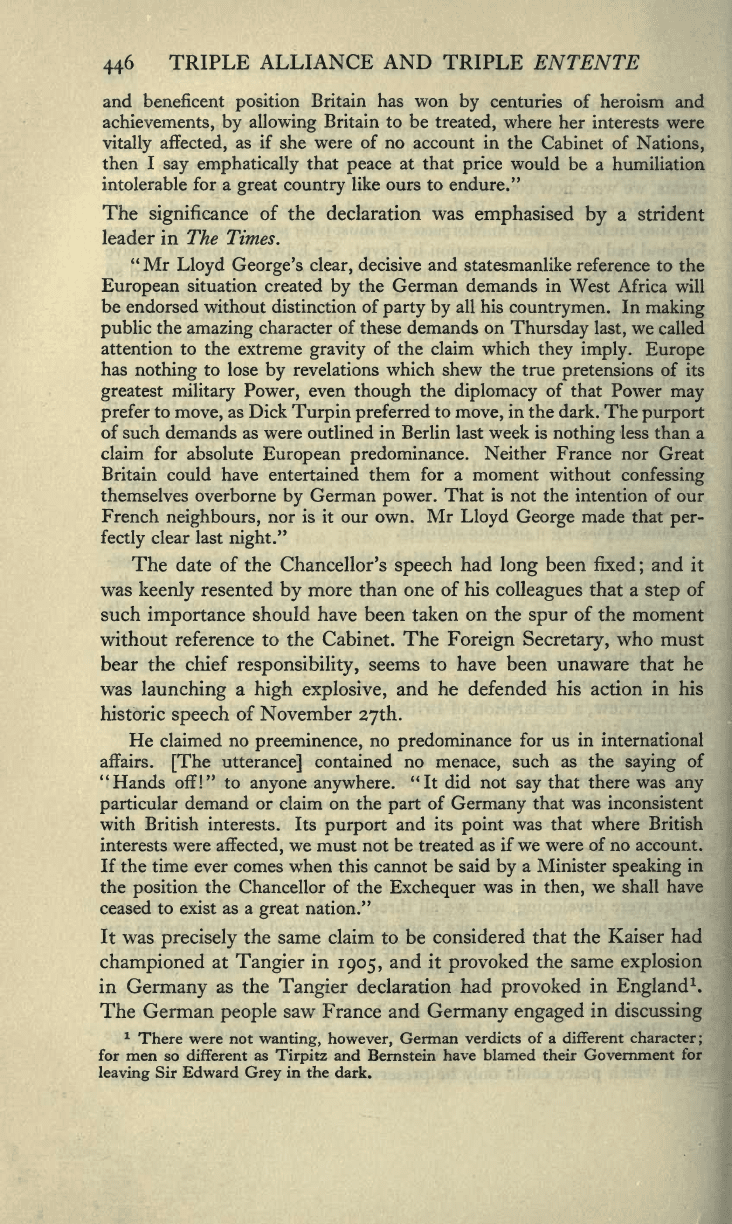
446
TRIPLE
ALLIANCE
AND
TRIPLE
ENTENTE
and
beneficent
position
Britain has won
by
centuries
of heroism and
achievements,
by allowing
Britain to be
treated,
where
her
interests were
vitally
affected,
as if she were
of
no
account
in
the
Cabinet
of
Nations,
then
I
say
emphatically
that
peace
at that
price
would
be a humiliation
intolerable for a
great country
like ours to
endure."
The
significance
of
the declaration was
emphasised
by
a
strident
leader in The
Times.
"Mr
Lloyd George's
clear,
decisive
and
statesmanlike
reference
to
the
European
situation
created
by
the German
demands
in
West Africa will
be endorsed without distinction of
party by
all his
countrymen.
In
making
public
the
amazing
character
of
these demands
on
Thursday
last,
we
called
attention to the extreme
gravity
of
the claim which
they
imply. Europe
has
nothing
to
lose
by
revelations which shew the true
pretensions
of its
greatest
military
Power,
even
though
the
diplomacy
of
that
Power
may
prefer
to
move,
as Dick
Turpin preferred
to
move,
in
the dark. The
purport
of
such demands
as
were outlined
in
Berlin
last
week is
nothing
less than a
claim for
absolute
European predominance.
Neither France
nor
Great
Britain
could have entertained
them for a moment without
confessing
themselves
overborne
by
German
power.
That is not the intention of
our
French
neighbours,
nor
is
it
our
own. Mr
Lloyd
George
made that
per-
fectly
clear
last
night."
The
date
of
the
Chancellor's
speech
had
long
been fixed
;
and
it
was
keenly
resented
by
more than
one of his
colleagues
that
a
step
of
such
importance
should have been taken
on the
spur
of
the moment
without reference
to
the
Cabinet. The
Foreign Secretary,
who
must
bear
the
chief
responsibility,
seems to
have been unaware that he
was
launching
a
high explosive,
and he defended
his action
in his
historic
speech
of November
27th.
He
claimed
no
preeminence,
no
predominance
for us in international
affairs.
[The utterance]
contained no
menace,
such
as the
saying
of
"Hands off!"
to
anyone anywhere.
"It did not
say
that
there
was
any
particular
demand
or
claim
on
the
part
of
Germany
that
was
inconsistent
with British
interests. Its
purport
and its
point
was that
where
British
interests were
affected,
we
must not be
treated
as
if
we were
of no
account.
If
the time ever comes
when
this
cannot
be said
by
a
Minister
speaking
in
the
position
the
Chancellor
of
the
Exchequer
was in
then,
we
shall have
ceased to exist as a
great
nation."
It
was
precisely
the
same claim
to
be
considered that the
Kaiser had
championed
at
Tangier
in
1905,
and it
provoked
the
same
explosion
in
Germany
as
the
Tangier
declaration
had
provoked
in
England
1
.
The German
people
saw
France
and
Germany engaged
in
discussing
1
There were
not
wanting,
however,
German
verdicts
of a different
character;
for men so different
as
Tirpitz
and
Bernstein
have
blamed their
Government
for
leaving
Sir Edward
Grey
in
the
dark.
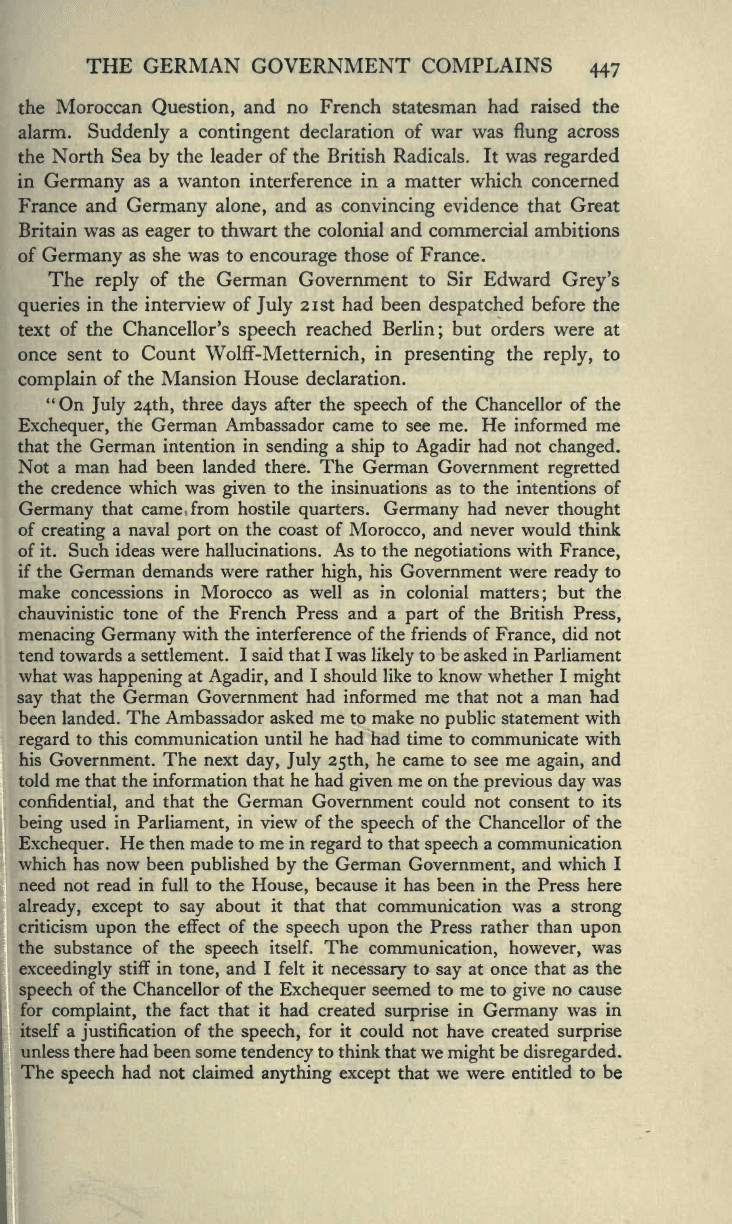
THE
GERMAN
GOVERNMENT
COMPLAINS
447
the
Moroccan
Question,
and no
French statesman
had
raised the
alarm.
Suddenly
a
contingent
declaration
of war was
flung
across
the
North
Sea
by
the leader of the
British
Radicals.
It
was
regarded
in
Germany
as a
wanton
interference
in
a
matter
which
concerned
France
and
Germany
alone,
and
as
convincing
evidence
that
Great
Britain
was
as
eager
to thwart the
colonial and
commercial ambitions
of
Germany
as she was
to
encourage
those
of
France.
The
reply
of
the
German Government to
Sir
Edward
Grey's
queries
in
the interview
of
July
21st
had been
despatched
before the
text
of the Chancellor's
speech
reached
Berlin;
but orders were at
once sent
to
Count
Wolff-Metternich,
in
presenting
the
reply,
to
complain
of
the Mansion
House
declaration.
"On
July 24th,
three
days
after the
speech
of
the Chancellor
of
the
Exchequer,
the German
Ambassador
came to see me. He informed me
that the
German intention in
sending
a
ship
to
Agadir
had
not
changed.
Not
a man
had
been
landed
there. The German
Government
regretted
the credence
which was
given
to the insinuations as
to the intentions
of
Germany
that came
from
hostile
quarters.
Germany
had
never
thought
of
creating
a naval
port
on the coast of
Morocco,
and never would think
of
it. Such ideas
were hallucinations. As to the
negotiations
with
France,
if
the German
demands were rather
high,
his
Government were
ready
to
make concessions
in
Morocco
as well as in
colonial
matters;
but the
chauvinistic tone
of the French Press and a
part
of
the British
Press,
menacing
Germany
with the interference
of
the friends of
France,
did not
tend towards
a
settlement.
I said that I
was
likely
to
be asked in Parliament
what was
happening
at
Agadir,
and I
should like to know
whether
I
might
say
that the German Government
had
informed
me
that not a man had
been landed.
The Ambassador asked me to make no
public
statement
with
regard
to this communication
until
he
had had
time to
communicate
with
his
Government.
The next
day, July
25th,
he
came
to
see
me
again,
and
told me that the information
that he
had
given
me on the
previous
day
was
confidential,
and that the German
Government could not consent
to its
being
used
in
Parliament,
in
view
of the
speech
of the
Chancellor
of the
Exchequer.
He then made to me
in
regard
to that
speech
a communication
which has now been
published by
the
German
Government,
and
which I
need not
read
in full to
the
House,
because
it
has been in the Press
here
already, except
to
say
about it that that
communication was
a
strong
criticism
upon
the effect of the
speech
upon
the
Press
rather
than
upon
the substance
of
the
speech
itself. The
communication,
however,
was
exceedingly
stiff
in
tone,
and I felt it
necessary
to
say
at
once
that
as the
speech
of
the Chancellor
of
the
Exchequer
seemed to me to
give
no cause
for
complaint,
the fact that it had created
surprise
in
Germany
was in
itself a
justification
of the
speech,
for it could
not have created
surprise
unless there had been some
tendency
to think
that
we
might
be
disregarded.
The
speech
had
not
claimed
anything
except
that
we
were entitled
to be
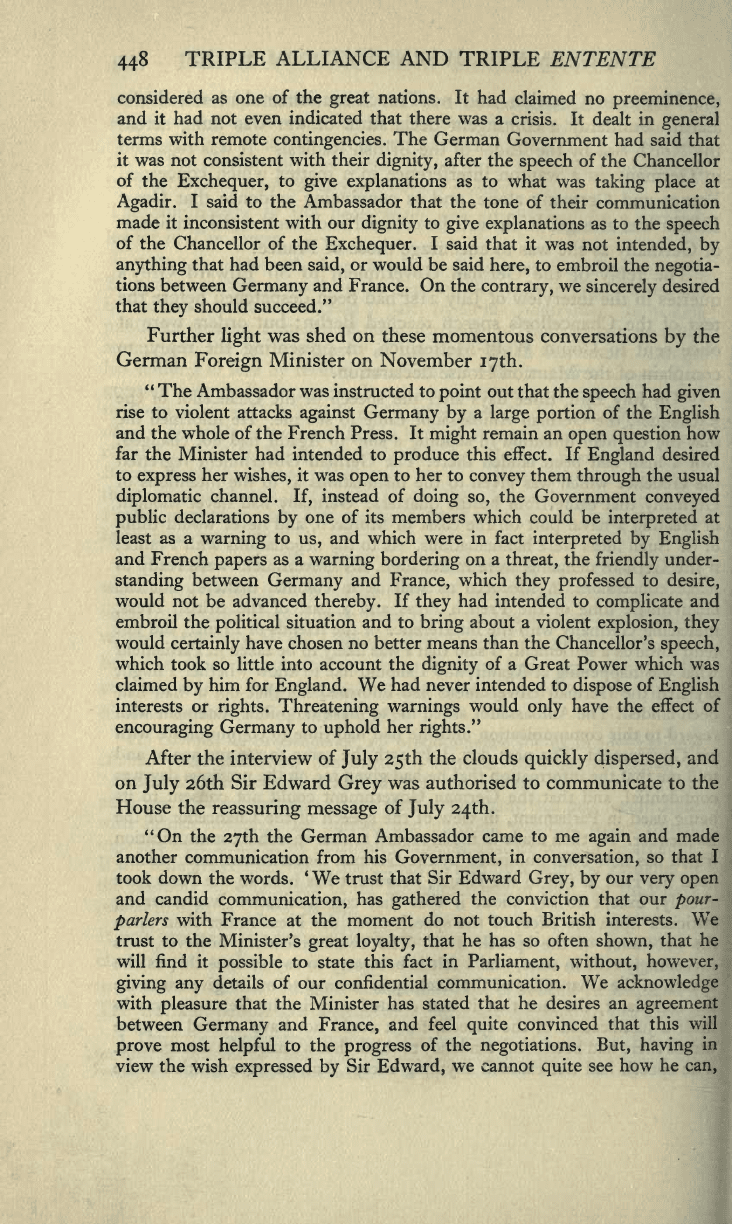
448
TRIPLE
ALLIANCE
AND
TRIPLE
ENTENTE
considered as
one
of
the
great
nations. It
had
claimed
no
preeminence,
and
it
had not even indicated that
there was a
crisis. It
dealt
in
general
terms
with
remote
contingencies.
The
German
Government
had said
that
it was
not consistent with their
dignity,
after the
speech
of the Chancellor
of
the
Exchequer,
to
give
explanations
as
to
what was
taking
place
at
Agadir.
I
said to the Ambassador that
the
tone
of
their communication
made it
inconsistent
with
our
dignity
to
give
explanations
as to the
speech
of
the
Chancellor
of
the
Exchequer.
I
said
that it was
not
intended,
by
anything
that had been
said,
or
would be said
here,
to
embroil the
negotia-
tions
between
Germany
and
France. On the
contrary,
we
sincerely
desired
that
they
should
succeed."
Further
light
was shed on
these
momentous conversations
by
the
German
Foreign
Minister
on
November
17th.
"
The Ambassador was instructed to
point
out that the
speech
had
given
rise to
violent attacks
against
Germany
by
a
large portion
of
the
English
and
the whole of the French
Press.
It
might
remain an
open
question
how
far
the Minister had
intended
to
produce
this effect. If
England
desired
to
express
her
wishes,
it was
open
to her to
convey
them
through
the usual
diplomatic
channel.
If,
instead of
doing
so,
the Government
conveyed
public
declarations
by
one
of
its
members
which
could be
interpreted
at
least as a
warning
to
us,
and which were
in
fact
interpreted
by English
and
French
papers
as a
warning
bordering
on a
threat,
the
friendly
under-
standing
between
Germany
and
France,
which
they professed
to
desire,
would not be
advanced
thereby.
If
they
had
intended
to
complicate
and
embroil
the
political
situation
and
to
bring
about a violent
explosion, they
would
certainly
have
chosen
no better means than the
Chancellor's
speech,
which took so little into
account
the
dignity
of a
Great Power which was
claimed
by
him for
England.
We
had
never intended to
dispose
of
English
interests or
rights. Threatening
warnings
would
only
have the
effect
of
encouraging
Germany
to
uphold
her
rights."
After
the interview of
July 25th
the
clouds
quickly
dispersed,
and
on
July
26th
Sir Edward
Grey
was authorised to communicate to
the
House
the
reassuring message
of
July
24th.
"On
the
27th
the German
Ambassador came
to
me
again
and made
another
communication
from his
Government,
in
conversation,
so that
I
took down
the
words.
'
We trust
that
Sir
Edward
Grey,
by
our
very
open
and candid
communication,
has
gathered
the conviction that
our
pour-
parlers
with
France at the moment
do
not touch British interests. We
trust
to
the
Minister's
great
loyalty,
that he
has
so often
shown,
that
he
will find it
possible
to state this
fact
in
Parliament,
without,
however,
giving any
details of our
confidential
communication.
We
acknowledge
with
pleasure
that
the
Minister has stated
that
he
desires an
agreement
between
Germany
and
France,
and feel
quite
convinced
that this
will
prove
most
helpful
to
the
progress
of the
negotiations.
But,
having
in
view the wish
expressed by
Sir
Edward,
we cannot
quite
see
how
he
can,
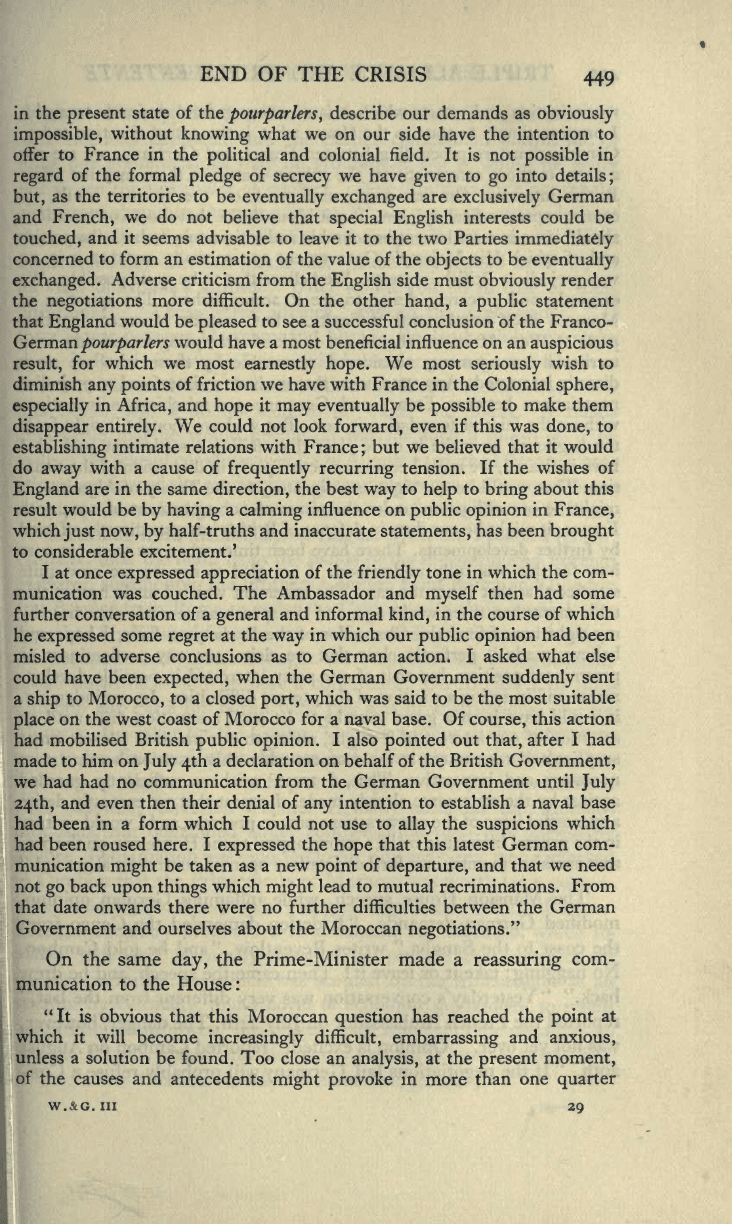
END
OF THE CRISIS
449
in the
present
state of
the
pourparlers,
describe our demands
as
obviously
impossible,
without
knowing
what we on our side have the
intention
to
offer
to France in
the
political
and
colonial field. It is
not
possible
in
regard
of the formal
pledge
of
secrecy
we have
given
to
go
into
details;
but,
as the territories
to be
eventually
exchanged
are
exclusively
German
and
French,
we
do
not
believe
that
special English
interests
could be
touched,
and it
seems advisable to
leave it to the two
Parties
immediately
concerned
to form an
estimation of the value of
the
objects
to be
eventually
exchanged.
Adverse criticism from
the
English
side must
obviously
render
the
negotiations
more difficult. On the other
hand,
a
public
statement
that
England
would be
pleased
to
see
a
successful conclusion
of
the Franco-
German
pourparlers
would
have
a
most
beneficial
influence on an
auspicious
result,
for which
we
most
earnestly hope.
We most
seriously
wish to
diminish
any
points
of
friction we have with
France
in the Colonial
sphere,
especially
in
Africa,
and
hope
it
may
eventually
be
possible
to make them
disappear entirely.
We
could not look
forward,
even
if this was
done,
to
establishing
intimate relations with
France;
but we
believed
that it would
do
away
with a
cause
of
frequently
recurring
tension.
If
the wishes
of
England
are
in
the same
direction,
the best
way
to
help
to
bring
about this
result
would
be
by having
a
calming
influence
on
public
opinion
in
France,
which
just
now,
by
half-truths and
inaccurate
statements,
has been
brought
to considerable excitement.'
I
at
once
expressed appreciation
of
the
friendly
tone
in which the com-
munication
was couched. The Ambassador
and
myself
then
had some
further conversation
of a
general
and informal
kind,
in
the
course of
which
he
expressed
some
regret
at
the
way
in which our
public opinion
had been
misled
to
adverse
conclusions as to German action.
I
asked
what else
could
have been
expected,
when the German Government
suddenly
sent
a
ship
to
Morocco,
to a
closed
port,
which
was
said to
be
the most suitable
place
on
the
west coast of Morocco
for
a naval base. Of
course,
this action
had mobilised British
public
opinion.
I
also
pointed
out
that,
after
I had
made to him
on
July 4th
a
declaration
on behalf of
the
British
Government,
we
had had no
communication
from the
German
Government until
July
24th,
and even then their denial
of
any
intention to establish
a
naval
base
had
been in a
form
which
I
could not use to
allay
the
suspicions
which
had
been roused here.
I
expressed
the
hope
that this
latest German
com-
munication
might
be taken
as a new
point
of
departure,
and that we
need
not
go
back
upon things
which
might
lead
to
mutual recriminations.
From
that date onwards
there were
no
further difficulties between the
German
Government
and
ourselves
about the Moroccan
negotiations."
On
the
same
day,
the
Prime-Minister made a
reassuring
com-
munication
to the House
:
"It
is obvious that
this Moroccan
question
has
reached
the
point
at
which it
will
become
increasingly
difficult,
embarrassing
and
anxious,
unless a
solution
be
found.
Too
close
an
analysis,
at the
present
moment,
of
the causes and
antecedents
might
provoke
in
more
than
one
quarter
w. &g.
in
29
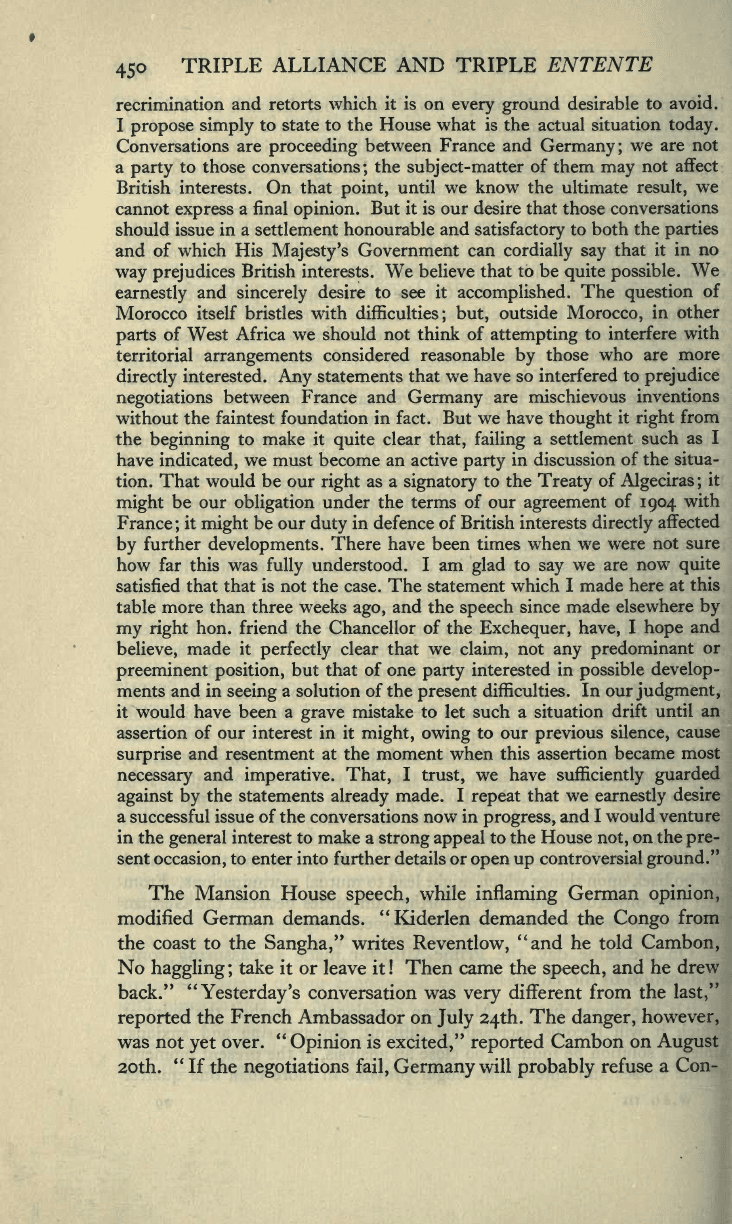
450
TRIPLE
ALLIANCE AND TRIPLE
ENTENTE
recrimination
and retorts which it is
on
every
ground
desirable
to avoid.
I
propose
simply
to state to the
House what is the
actual
situation
today.
Conversations
are
proceeding
between France
and
Germany;
we
are
not
a
party
to
those
conversations;
the
subject-matter
of
them
may
not affect
British interests.
On that
point,
until we know the ultimate
result,
we
cannot
express
a
final
opinion.
But it is
our
desire
that
those conversations
should issue
in a
settlement
honourable
and
satisfactory
to
both the
parties
and of which His
Majesty's
Government can
cordially
say
that
it in
no
way prejudices
British interests. We believe
that
to
be
quite possible.
We
earnestly
and
sincerely
desire to see
it
accomplished.
The
question
of
Morocco
itself bristles
with
difficulties;
but,
outside
Morocco,
in
other
parts
of
West
Africa
we should not think
of
attempting
to
interfere
with
territorial
arrangements
considered reasonable
by
those
who are
more
directly
interested.
Any
statements that we have
so interfered
to
prejudice
negotiations
between France and
Germany
are
mischievous
inventions
without the faintest foundation
in
fact.
But
we
have
thought
it
right
from
the
beginning
to make it
quite
clear
that,
failing
a settlement
such
as
I
have
indicated,
we
must become
an
active
party
in
discussion
of the
situa-
tion. That
would be our
right
as
a
signatory
to the
Treaty
of
Algeciras
;
it
might
be our
obligation
under
the
terms
of our
agreement
of
1904
with
France
;
it
might
be
our
duty
in
defence
of British interests
directly
affected
by
further
developments.
There have been times when we
were
not sure
how far this was
fully
understood.
I
am
glad
to
say
we
are
now
quite
satisfied
that that is not the case. The statement
which
I made here
at
this
table more than three weeks
ago,
and
the
speech
since
made elsewhere
by
my
right
hon. friend
the Chancellor
of
the
Exchequer,
have,
I
hope
and
believe,
made
it
perfectly
clear
that
we
claim,
not
any predominant
or
preeminent position,
but that of one
party
interested
in
possible
develop-
ments
and in
seeing
a solution of the
present
difficulties.
In our
judgment,
it would
have
been a
grave
mistake to let such a situation
drift
until
an
assertion of our
interest
in
it
might, owing
to our
previous
silence,
cause
surprise
and
resentment
at the moment when this
assertion
became
most
necessary
and
imperative.
That,
I
trust,
we
have
sufficiently guarded
against
by
the statements
already
made.
I
repeat
that we
earnestly
desire
a
successful issue
of the
conversations
now in
progress,
and
I would venture
in
the
general
interest to
make
a
strong appeal
to
the
House
not,
on the
pre-
sent
occasion,
to
enter into further details or
open
up
controversial
ground."
The Mansion
House
speech,
while
inflaming
German
opinion,
modified German
demands. "Kiderlen
demanded the
Congo
from
the
coast to the
Sangha,"
writes
Reventlow,
"and
he
told
Cambon,
No
haggling
;
take
it
or
leave it
!
Then
came the
speech,
and
he drew
back."
"Yesterday's
conversation
was
very
different
from the
last,"
reported
the
French
Ambassador on
July 24th.
The
danger,
however,
was
not
yet
over.
"
Opinion
is
excited,"
reported
Cambon
on
August
20th.
"
If
the
negotiations
fail,
Germany
will
probably
refuse
a
Con-
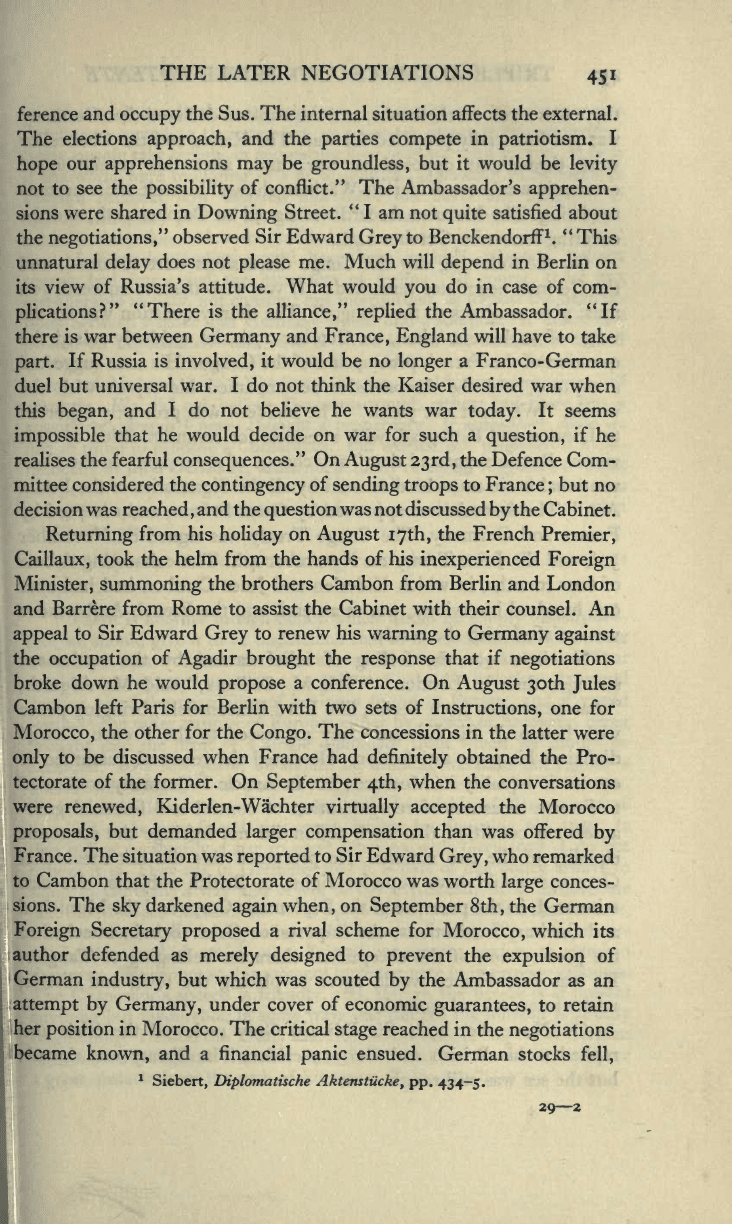
THE
LATER
NEGOTIATIONS
451
ference
and
occupy
the Sus. The
internal situation affects
the external.
The
elections
approach,
and
the
parties compete
in
patriotism.
I
hope
our
apprehensions
may
be
groundless,
but it would be
levity
not
to
see the
possibility
of
conflict.
"
The Ambassador's
apprehen-
sions
were
shared
in
Downing
Street. "lam
not
quite
satisfied about
the
negotiations,"
observed
Sir Edward
Grey
to Benckendorff
1
.
"
This
unnatural
delay
does
not
please
me. Much
will
depend
in Berlin on
its
view of
Russia's
attitude. What
would
you
do
in
case
of com-
plications?"
"There is
the
alliance,"
replied
the
Ambassador. "If
there
is war between
Germany
and
France,
England
will
have
to take
part.
If Russia is
involved,
it
would
be no
longer
a
Franco-German
duel
but universal
war.
I
do
not
think the Kaiser desired
war
when
this
began,
and
I
do
not
believe he wants
war
today.
It seems
impossible
that
he would decide
on war for
such
a
question,
if
he
realises the
fearful
consequences."
On
August 23rd,
the Defence Com-
mittee
considered the
contingency
of
sending
troops
to France
;
but
no
decision
was
reached,
and the
question
was
not discussed
by
the
Cabinet.
Returning
from his
holiday
on
August
17th,
the French
Premier,
Caillaux,
took the
helm from the hands of his
inexperienced
Foreign
Minister,
summoning
the
brothers Cambon from
Berlin and
London
and Barrere from
Rome
to
assist
the Cabinet with
their
counsel. An
appeal
to Sir Edward
Grey
to
renew his
warning
to
Germany
against
the
occupation
of
Agadir brought
the
response
that
if
negotiations
broke
down
he would
propose
a
conference. On
August
30th
Jules
Cambon
left
Paris
for Berlin
with two sets of
Instructions,
one for
Morocco,
the other
for
the
Congo.
The
concessions in
the
latter were
only
to be discussed when
France had
definitely
obtained
the Pro-
tectorate
of
the
former.
On
September
4th,
when
the
conversations
were
renewed,
Kiderlen-Wachter
virtually
accepted
the Morocco
proposals,
but
demanded
larger
compensation
than was
offered
by
France.
The
situation
was
reported
to
Sir
Edward
Grey,
who
remarked
to Cambon
that the
Protectorate
of
Morocco was
worth
large
conces-
sions.
The
sky
darkened
again
when,
on
September
8th,
the German
Foreign
Secretary
proposed
a
rival
scheme for
Morocco,
which
its
author defended as
merely designed
to
prevent
the
expulsion
of
German
industry,
but
which
was
scouted
by
the Ambassador as an
attempt
by
Germany,
under
cover
of
economic
guarantees,
to retain
her
position
in
Morocco. The
critical
stage
reached
in
the
negotiations
became
known,
and
a
financial
panic
ensued.
German
stocks
fell,
1
Siebert,
Diplomatische Aktenstiicke,
pp. 434-5.
29
—
2
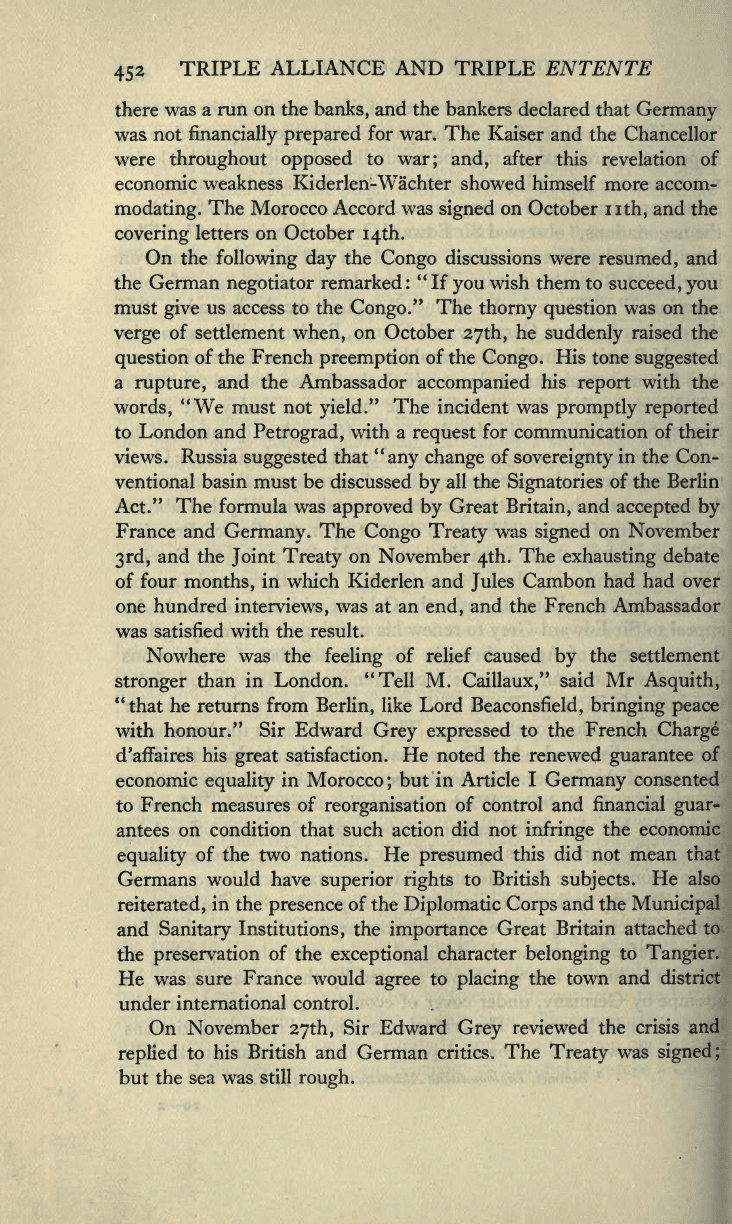
452
TRIPLE
ALLIANCE AND
TRIPLE
ENTENTE
there
was
a run
on
the
banks,
and the bankers
declared that
Germany
was
not
financially
prepared
for
war. The Kaiser
and
the Chancellor
were
throughout
opposed
to
war; and,
after
this revelation
of
economic
weakness Kiderlen-Wachter showed
himself more
accom-
modating.
The
Morocco Accord was
signed
on
October
nth,
and
the
covering
letters on October
14th.
On the
following
day
the
Congo
discussions
were
resumed,
and
the
German
negotiator
remarked
:
"
If
you
wish
them to
succeed,
you
must
give
us access to the
Congo."
The
thorny question
was on the
verge
of settlement
when,
on
October
27th,
he
suddenly
raised
the
question
of
the French
preemption
of the
Congo.
His
tone
suggested
a
rupture,
and
the
Ambassador
accompanied
his
report
with the
words,
"We
must
not
yield."
The
incident
was
promptly
reported
to
London and
Petrograd,
with
a
request
for
communication
of their
views.
Russia
suggested
that
"any change
of
sovereignty
in
the
Con-
ventional
basin
must
be discussed
by
all the
Signatories
of
the Berlin
Act."
The formula
was
approved by
Great
Britain,
and
accepted
by
France
and
Germany.
The
Congo Treaty
was
signed
on November
3rd,
and the
Joint
Treaty
on November
4th.
The
exhausting
debate
of
four
months,
in which
Kiderlen
and
Jules
Cambon had
had over
one
hundred
interviews,
was
at an
end,
and the French Ambassador
was satisfied
with the
result.
Nowhere
was
the
feeling
of relief caused
by
the settlement
stronger
than
in
London. "Tell M.
Caillaux,"
said Mr
Asquith,
"that
he returns
from
Berlin,
like
Lord
Beaconsfield,
bringing
peace
with
honour."
Sir Edward
Grey expressed
to
the
French
Charge
d'affaires
his
great
satisfaction. He noted the renewed
guarantee
of
economic
equality
in Morocco
;
but
in
Article
I
Germany
consented
to
French
measures
of
reorganisation
of
control
and
financial
guar-
antees
on condition
that
such
action
did
not
infringe
the economic
equality
of the two
nations.
He
presumed
this
did
not
mean
that
Germans
would
have
superior
rights
to British
subjects.
He
also
reiterated,
in
the
presence
of
the
Diplomatic
Corps
and the
Municipal
and
Sanitary
Institutions,
the
importance
Great
Britain
attached
to
the
preservation
of
the
exceptional
character
belonging
to
Tangier.
He was
sure France
would
agree
to
placing
the town
and district
under international
control.
On
November
27th,
Sir
Edward
Grey
reviewed
the
crisis
and
replied
to
his British and
German
critics.
The
Treaty
was
signed;
but the
sea was still
rough.
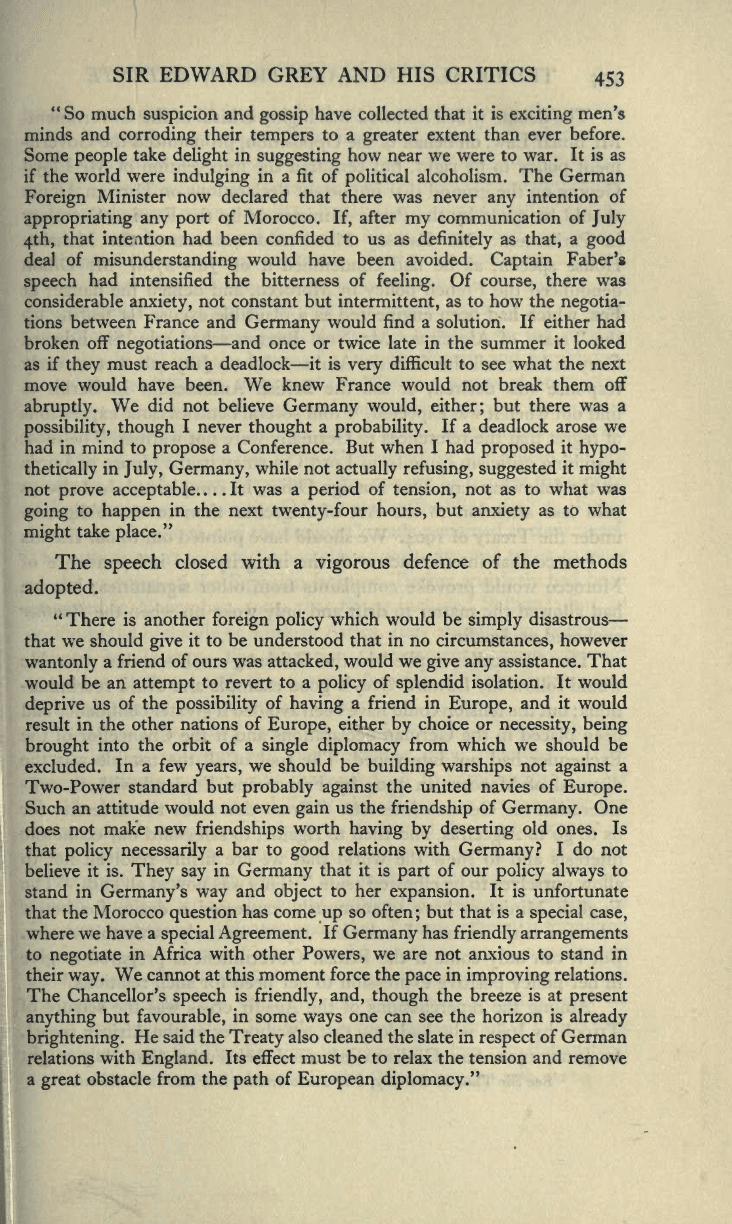
SIR EDWARD GREY
AND
HIS CRITICS
453
11
So much
suspicion
and
gossip
have collected
that it
is
exciting
men's
minds
and
corroding
their
tempers
to a
greater
extent
than ever
before.
Some
people
take
delight
in
suggesting
how
near we were
to
war.
It is
as
if
the
world
were
indulging
in a fit of
political
alcoholism. The German
Foreign
Minister
now
declared that there
was
never
any
intention
of
appropriating
any port
of
Morocco.
If,
after
my
communication
of
July
4th,
that intention had been
confided to
us
as
definitely
as
that,
a
good
deal
of
misunderstanding
would
have been avoided.
Captain
Faber's
speech
had intensified the
bitterness
of
feeling.
Of
course,
there was
considerable
anxiety,
not
constant but
intermittent,
as
to
how the
negotia-
tions between France
and
Germany
would find a solution. If
either
had
broken
off
negotiations
—
and
once
or twice
late
in the
summer
it looked
as
if
they
must
reach
a
deadlock
—
it
is
very
difficult to see what the next
move
would have been. We knew France
would
not break
them off
abruptly.
We
did
not believe
Germany
would, either;
but
there
was a
possibility,
though
I
never
thought
a
probability.
If a
deadlock arose we
had
in mind to
propose
a
Conference.
But when
I
had
proposed
it
hypo-
thetically
in
July, Germany,
while
not
actually refusing, suggested
it
might
not
prove
acceptable
It was
a
period
of
tension,
not as to what was
going
to
happen
in the next
twenty-four
hours,
but
anxiety
as to what
might
take
place."
The
speech
closed
with
a
vigorous
defence
of
the
methods
adopted.
"
There
is another
foreign policy
which would be
simply
disastrous
—
that we should
give
it to be understood that
in
no
circumstances,
however
wantonly
a
friend
of ours
was
attacked,
would
we
give any
assistance.
That
would be
an
attempt
to
revert
to a
policy
of
splendid
isolation. It would
deprive
us
of the
possibility
of
having
a
friend
in
Europe,
and
it
would
result
in the
other
nations of
Europe,
either
by
choice
or
necessity, being
brought
into the
orbit of a
single diplomacy
from
which
we
should be
excluded.
In a few
years,
we should be
building
warships
not
against
a
Two-Power
standard
but
probably against
the united navies of
Europe.
Such
an attitude
would not even
gain
us the
friendship
of
Germany.
One
does not
make
new
friendships
worth
having by
deserting
old
ones.
Is
that
policy
necessarily
a bar to
good
relations with
Germany?
I do not
believe it
is.
They say
in
Germany
that it is
part
of
our
policy always
to
stand
in
Germany's way
and
object
to
her
expansion.
It is unfortunate
that the
Morocco
question
has
come
up
so
often
;
but that
is a
special
case,
here we
have
a
special Agreement.
If
Germany
has
friendly
arrangements
negotiate
in Africa with
other
Powers,
we are not
anxious
to stand
in
heir
way.
We
cannot at this moment
force
the
pace
in
improving
relations.
The Chancellor's
speech
is
friendly,
and,
though
the breeze
is at
present
anything
but
favourable,
in
some
ways
one
can see
the
horizon is
already
brightening.
He said the
Treaty
also
cleaned the
slate
in
respect
of German
relations
with
England.
Its
effect
must be to
relax the tension
and
remove
a
great
obstacle
from
the
path
of
European diplomacy."
:
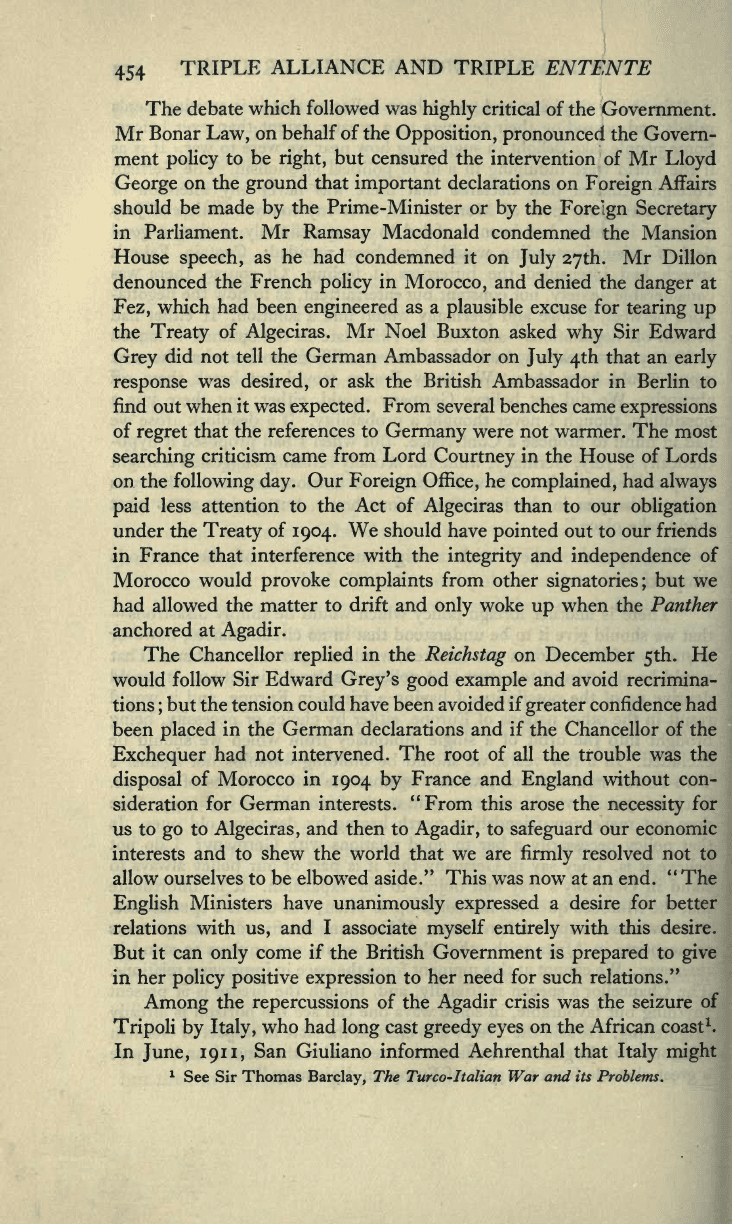
454
TRIPLE
ALLIANCE
AND
TRIPLE ENTENTE
The
debate
which followed was
highly
critical of
the Government.
Mr
Bonar
Law,
on behalf of
the
Opposition,
pronounced
the Govern-
ment
policy
to
be
right,
but censured the
intervention of
Mr
Lloyd
George
on the
ground
that
important
declarations
on
Foreign
Affairs
should
be made
by
the Prime-Minister or
by
the
Foreign Secretary
in Parliament. Mr
Ramsay
Macdonald
condemned
the
Mansion
House
speech,
as
he had
condemned
it
on
July
27th.
Mr Dillon
denounced
the
French
policy
in
Morocco,
and
denied the
danger
at
Fez,
which had
been
engineered
as a
plausible
excuse for
tearing
up
the
Treaty
of
Algeciras.
Mr
Noel Buxton
asked
why
Sir Edward
Grey
did
not
tell the German Ambassador on
July 4th
that an
early
response
was
desired,
or
ask the British
Ambassador
in
Berlin to
find
out
when it
was
expected.
From
several
benches came
expressions
of
regret
that
the references to
Germany
were not warmer. The
most
searching
criticism
came from Lord
Courtney
in
the House
of Lords
on
the
following
day.
Our
Foreign
Office,
he
complained,
had
always
paid
less attention to the Act
of
Algeciras
than
to
our
obligation
under the
Treaty
of
1904.
We should
have
pointed
out to
our
friends
in France that
interference with the
integrity
and
independence
of
Morocco
would
provoke complaints
from
other
signatories;
but we
had allowed the matter
to
drift
and
only
woke
up
when the
Panther
anchored
at
Agadir.
The
Chancellor
replied
in
the
Reichstag
on
December
5th.
He
would
follow Sir
Edward
Grey's
good
example
and
avoid recrimina-
tions
;
but the
tension
could have been avoided if
greater
confidence
had
been
placed
in
the
German
declarations
and if
the
Chancellor
of
the
Exchequer
had
not intervened. The
root
of
all
the trouble was the
disposal
of Morocco
in
1904 by
France and
England
without
con-
sideration
for
German interests.
"From
this arose the
necessity
for
us
to
go
to
Algeciras,
and
then to
Agadir,
to
safeguard
our economic
interests
and
to
shew
the world
that
we
are
firmly
resolved not
to
allow
ourselves
to
be elbowed aside."
This was
now
at an
end.
"
The
English
Ministers have
unanimously
expressed
a desire
for
better
relations
with
us,
and
I
associate
myself entirely
with
this
desire.
But
it
can
only
come
if
the
British
Government
is
prepared
to
give
in her
policy
positive expression
to her need
for
such relations."
Among
the
repercussions
of
the
Agadir
crisis was
the
seizure
of
Tripoli
by
Italy,
who
had
long
cast
greedy
eyes
on
the
African coast
1
.
In
June,
191
1,
San
Giuliano
informed Aehrenthal
that
Italy
might
1
See Sir
Thomas
Barclay,
The Turco-Italian War
and its
Problems.
